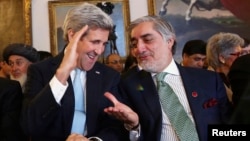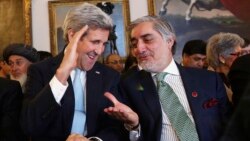Well over a decade after the Taliban was ousted from power in Afghanistan, the country is still relatively fragile. Nonetheless, Afghanistan’s new leaders, President Ashraf Ghani and Chief Executive Officer Abdullah Abdullah, as well as Afghanistan’s many international supporters, are optimistic about the future.
In 2012, Tokyo hosted a conference of Afghanistan’s supporters, in hopes of raising enough money to ensure Afghanistan would be able to continue its development progress through the political and security transitions in 2014 and beyond. At the time, Conference participants agreed to meet in two years’ time to take stock of Afghanistan’s progress.
That meeting, and an evaluation of Afghanistan’s progress since the Tokyo Conference, took place in London in early December. “Afghanistan has obviously made enormous progress. It’s just a transformation taking place,” said Secretary of State John Kerry. So for example, over the past two years, ISAF forces have steadily transferred security responsibilities to Afghanistan’s own forces, and now only provide limited support.
In September, for the first time in history, a peaceful transfer of power from one democratically-elected leader to another took place in Afghanistan, when the new Government of National Unity assumed power in Kabul.
President Ghani and CEO Abdullah have already presented a reform agenda that expands a framework agreed upon in Tokyo, said Secretary Kerry. “During their short time in office, they’ve taken steps to combat money laundering and corruption, improve the country’s fiscal situation, and foster better relations with their neighbors, including importantly – perhaps most importantly – Pakistan.”
In one sign of progress, on December 3rd, Afghanistan, Tajikistan, Kyrgyzstan, and Pakistan signed an important agreement related to the CASA-1000 electricity transmission project, which, when complete, will facilitate transfer of electricity from energy producers Kyrgyzstan and Tajikistan, to energy-poor Pakistan and Afghanistan. This will help alleviate a significant roadblock to Afghanistan’s and Pakistan’s economic development.
“The Afghan people should be very proud of this progress. And as they continue to move forward, they can be confident of the support of the international community,” said Secretary Kerry.
The United States is committed to helping Afghanistan attain stability and prosperity, because it serves our own long-term national security interests, he said. “Looking ahead, we will engage regularly and constructively with Afghan leaders, both in government and civil society, to assist where and when we can.”






